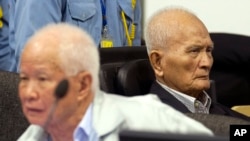Experts continue to analyze the meaning and importance of last week’s verdict for two aging Khmer Rouge leaders.
For some observers, the verdict and life sentences for Nuon Chea and Khieu Samphan marked progress for a court that has been financially struggling and criticized for its slowness. For others, though, the fact that only three leaders have faced trial since 2006 means the court is failing to bring justice to the victims of the brutal regime.
“It is a small victory, for justice and for victims of the Khmer Rouge,” said Beth Van Schaack, visiting scholar at the Center for International Security and Cooperation, at Stanford University. “It is not enough, it comes too late, but it is something. No one can ever question whether the Khmer Rouge was as a brutal regime. And generations of Cambodians will be educated about their own country’s history and will be in a better position to ensure that such crimes are not repeated—in Cambodia or elsewhere.”
More than 4,000 people watched the court proceedings from inside the tribunal, and another 200,000 participated in one way or another through forums around the country, she said. This was unprecedented in other war crimes tribunals and is an important victory, she added. “And we now have a judgment that goes to the highest level of Khmer Rouge leadership.”
Ear Sophal, a Cambodian-American scholar and author who lost both parents and a brother to the regime, said the decision provided some measure of justice. “I think this was a positive development,” he said, “even if, of course, the confidence I had in the tribunal over the last few years had been minimal, due to corruption, political interference, incompetence and other issues we’ve seen unfold over the years.”
Nate Thayer, an American journalist who interviewed Pol Pot in 1997, as well as other senior leaders of the Khmer Rouge, said the verdict will not render justice to their victims. Thousands of former Khmer Rouge are now in government, he said, and the tribunal itself failed to provide a good model as an independent judiciary.
“For any Cambodian, it doesn’t bring justice, it doesn’t bring closure,” he said. “The same corrupt people and murderous people are in power in their government today. This was a public relations event, and the real scandal is that the international community and the UN gave their stamps of approval to a farce and an insult to international justice,” he said. “Make no mistake: Nuon Chea is a war criminal, and he belongs in jail, but he himself didn’t kill two million people. There were hundreds of thousands of others who were involved.”
The tribunal is heavily supported by the UN, which has prosecutors, judges and staff working with Cambodian counterparts at the court.
Eri Kaneko, a spokeswoman for the UN Secretary-General Ban Ki-moon, called last week’s verdicts a “milestone” for the court and a historic moment for criminal justice.
“It demonstrates that there will be no impunity for the most serious international crimes,” she said. “The fact that the judgment was delivered some 30 years after the events in question sends a powerful message to anyone who may consider committing such crimes in the future. The secretary-general has consistently reiterated his commitment that there must be accountability for those who would perpetrate such crimes.”
Ban is confident the court will move forward with the second and final phase of the trial of Nuon Chea and Khieu Samphan, she said. “And as the investigations continue in cases 003 and 004, he calls upon the government of Cambodia and the international community to continue to support and uphold the independent judicial process.”




